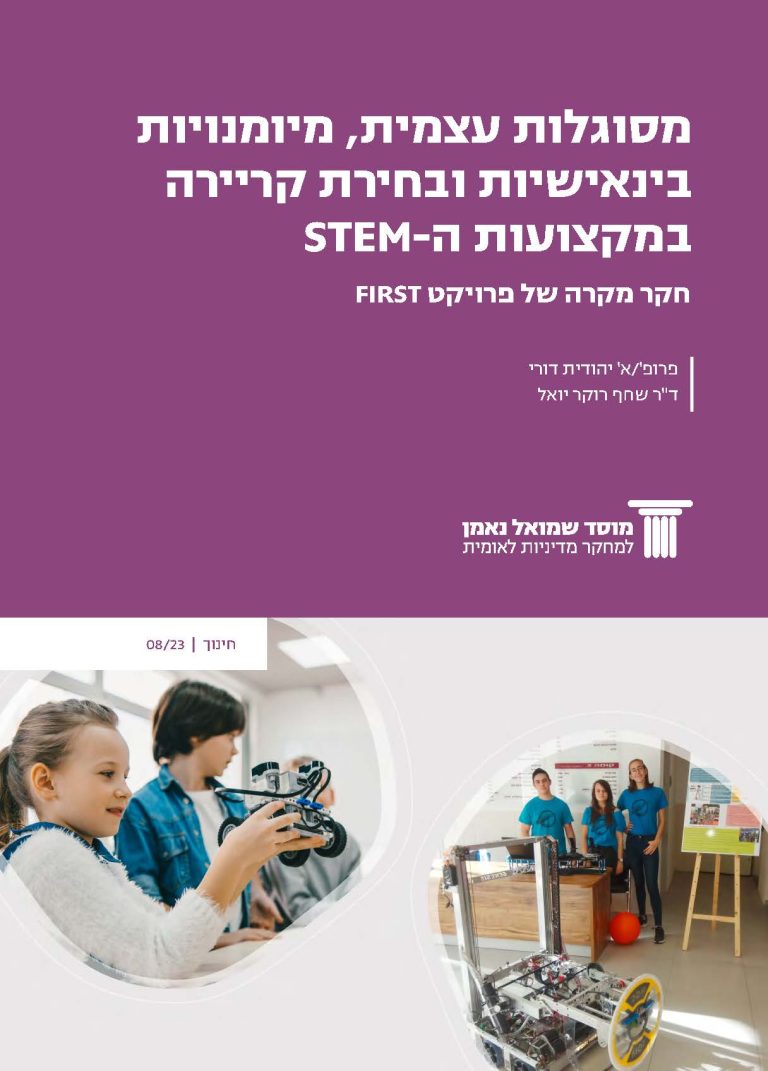פרויקט הרובוטיקה For Inspiration and Recognition of Science and Technology (FIRST), משלב למידה מבוססת פרויקטים (PBL) ומטרתו לטפח כישורים בינאישיים ובחירת קריירה בתחומי המדע והטכנולוגיה בקרב תלמידים. פרויקט FIRST נוסד בארצות הברית בשנת 1992, לאחר שהורגשה האטה בבחירת מקצועות טכנולוגיים ומדעיים על ידי תלמידים. הפרויקט החל בארץ בשנת 2005 והוא מיועד לתלמידים החל מגן חובה ועד סיום התיכון. כיום, משתתפות בפרויקט יותר מ-80 מדינות ברחבי העולם ולמעלה מ-500,000 תלמידים בגילאים שונים ומתוכם כ-12,000 תלמידים בישראל. התלמידים מלווים על ידי מאות מורים וחונכים, רובם מתנדבים. התלמידים, בהתאם לשכבות הגיל, מתחרים מידי שנה בתחרויות מקומיות ובתחרויות בינלאומיות. המחקר הנוכחי התמקד בתלמידי תיכון ובתחרות ה-FRC- FIRST Robotics Competition. חשיבות הפרויקט נובעת מהעידוד למיומנויות בינאישיות, פיתוח רובוט ועידוד ללימודי המשך וקריירה בעיקר בתחומי מדע, טכנולוגיה, הנדסה ומתמטיקה (STEM).
המחקר בדק האם ובאיזה אופן פרויקט FIRST משפיע על המשתתפים בו במדינת ישראל— תלמידי תיכון המשתתפים בפרויקט, בוגרי הפרויקט וחונכים (מנטורים) המנחים את התלמידים בפרויקט, ביחס למסוגלות העצמית, המיומנויות הבינאישיות שלהם ובחירתם בקריירה בתחומי STEM. . המחקר התבסס על התיאוריה החברתית קוגניטיבית (SCT) על פי Bandura (1986) ועל התיאוריה של קריירה חברתית-קוגניטיבית (SCCT) על פי Lent ועמיתיו (2000). תאוריות אלו מסבירות כי השיקול לבחור במקצוע להרחבה בתיכון בתחומי ה-STEM או באוניברסיטה ו/או בקריירה נובע מתחושת המסוגלות העצמית, ממשתני הרקע, הציפיות של התלמיד.ה מהבחירה במקצוע, גורמי סביבה והתנהגות.
במחקר השתתפו 468 נחקרים שכללו דירקטורים ב-FIRST ישראל (N=3) שאינם חלק מאוכלוסיית המחקר, חונכים (N=49), בוגרים (N=297), ותלמידים בכיתות יא’-יב’ (N=119). שיטת המחקר שילבה כלים איכותניים וכמותיים על פי מודל מחקר מקביל מתכנס בו ראיונות ושאלונים נערכו במקביל. במסגרת המחקר, נערכו ראיונות חצי מובנים עם שאלות המותאמות לכל אחת מקבוצות המשתתפים (N=29), מחצית מהמרואיינים היו גברים ומחציתם נשים. הראיונות ארכו כשעה, עברו תמלול, חלוקה וקידוד היגדים לתמות וקטגוריות. כלי המחקר הכמותיים כללו שלושה סוגי שאלונים בהתאמה לכל קבוצה של בוגרים, תלמידים וחונכים. השאלונים הופצו דרך הרשתות החברתיות, כל שאלון כלל שאלות פתוחות וסגורות. השאלונים כללו היגדים השייכים לכל אחת מהתמות הראשיות בתיאוריה החברתית—קוגניטיבית: אישי, סביבתי והתנהגותי—לבחירה בסולם ליקרט (1-5).
ממצאי המחקר מראים כי לפרויקט FIRST יש השפעה משמעותית על שיפור המיומנויות הבינאישיות ועל המסוגלות העצמית הן של הבוגרים והן של התלמידים. כמו כן, הפעילות בפרויקט FIRST מטפחת חשיפה למקצועות STEM ובחירת קריירה בתחומי ה-STEM בקרב המשתתפים. נמצא כי ההשפעה של הפרויקט על בחירת הקריירה ב-STEM גדולה יותר בקרב גברים מאשר נשים. החשיפה ל-STEM באמצעות הפרויקט, מבחינת היכרות עם העולם הטכנולוגי והאנשים העוסקים בו, השפיעה יותר על נשים מאשר על גברים. נמצא כי החשיפה ל-STEM החלה מהרגע הראשון להצטרפותם; החל מבית הספר היסודי, דרך חטיבת הביניים, תיכון, בלימודים גבוהים ועד לשלב בחירת הקריירה. ההשפעה על מסוגלות עצמית ומיומנויות בינאישיות נמצאה חזקה יותר ככל שהחשיפה לפרויקט FIRST התרחשה בגיל צעיר יותר. להשתתפות ב-FIRST יש השפעה רבה יותר על בחירת קריירה והשכלה גבוהה בתחומי STEM, בתלמידים שלא בחרו STEM כמגמה בתיכון. בקרב המשתתפים בפרויקט FIRST, אחוז הבוחרים להמשיך בלימודים גבוהים ובקריירה ב-STEM גבוה מאד בהשוואה לכלל התלמידים בשכבת גיל זהה וזהה לאחוז שבוחר ללמוד מקצועות אלו בתיכון (94%). מכאן עולה שההשתתפות בפרויקט FIRST מגדילה את הסיכוי להמשיך במסלול STEM. כמו כן, בהתבסס על השאלונים נמצאו חמישה גורמים המשפיעים על המשתתפים ב-FIRST, הן על התלמידים והן על הבוגרים: (1) תרומת הפרויקט לפיתוח מיומנויות בינאישיות, (2) השפעת הפרויקט על בחירת קריירה, (3) השפעת התמיכה של המשפחה והחברים על השתתפות בפרויקט, (4) חשיפה ל-STEM באמצעות הפרויקט ותמיכת מורים בהשתתפות בפרויקט, ו-(5) מוטיבציה חיצונית בפרויקט בנושא פרסים, תחרויות ויוקרה. בין חמשת הגורמים קיימות קורלציות חיוביות מובהקות.
בנוסף, ניתחנו את דמותו של החונך בהשוואה לכל המשתתפים האחרים באמצעות הראיונות והשאלונים. בראיונות עלו מאפיינים ייחודיים, כגון: הרצון להיות חלק מקבוצה, החשיבות של מיומנויות בינאישיות, רצון לתרומה אישית, התנדבות ועמידה מול אתגרים והחונך כמחנך. נמצאו הבדלים במאפיינים ובהשפעות של פרויקט FIRST על חונכות (נשים) בהשוואה לחונכים. נמצא כי לפרויקט השפעה ברמה גבוהה יותר על החונכות מאשר על החונכים בנושאים המתייחסים לסטיגמות בהקשר ל-STEM, למוטיבציה חיצונית ולתפקידן כמחנכות. לעומת זאת, נושאים המתייחסים לבחירת קריירה ומסוגלות עצמית בהקשר של משימתיות ובטחון עצמי הופיעו בשכיחות גבוהה יותר בקרב החונכים מאשר בקרב החונכות. בראיונות עלו גם תתי קטגוריות חדשות, בהקשר לתיאוריית הקריירה החברתית קוגניטיבית ואשר אינן מקבלות מענה בתיאוריה הקיימת. תתי הקטגוריות הללו מתייחסות לקשר בין חונכים לחניכים: בתמה הסביבתית – השפעת החונך, בתמה ההתנהגותית – יחסי חונך-תלמיד, הנחייה בפן המשימתי-מקצועי, והנחייה בפן ההתנהגותי-חברתי.
במחקר המשך מומלץ להעמיק את המחקר על בוגרות FIRST שזכו במלגת לימודים לטכניון, בהיבטים של הבדלי מגדר בהשפעת הפרויקט על העניין ב-STEM, והבנה לגבי הסיבות לירידה באחוז הבנות המשתתפות בפרויקט ככל שהגיל שלהן עולה.
למחקר תרומה בהיבטים שונים: התרומה התיאורטית היא לתיאוריית הקריירה החברתית קוגניטיבית באמצעות: (א) העמקת ההבנה של גורמים המשפיעים על בחירות הקריירה של המשתתפים בפרויקט (ב) מציאת קשרים בין מסוגלות עצמית, כישורים בינאישיים ובחירותיהם בפועל ו-(ג) זיהוי תתי קטגוריות חדשות המתייחסות לקשר בין חונכים לחניכים בתמות הסביבתית וההתנהגותית. התרומה המתודולוגית היא בעיצוב שלושת סוגי השאלונים לבוגרים, תלמידים וחונכים ובנית מחוון לניתוח הראיונות. השאלונים והמחוון הללו יוכלו להוות כלי מחקר במחקרי המשך בארץ ובעולם ויתמקדו בקבוצות חניכים וחונכים והקשרים ביניהם. בהיבט היישומי, הבנה מעמיקה של השפעת פרויקט רובוטיקה בקרב שלש האוכלוסיות שנחקרו יכול לתרום בעידוד להרחבת המאגר האנושי בתחומי ה-STEM. המחקר הנוכחי מדגיש את היתרונות של שילוב פרויקט FIRST במגוון שכבות גיל של תלמידים ותלמידות תוך כדי מתן שוויון הזדמנויות וחשיבות החשיפה מגיל צעיר לתחומי ה-STEM.












